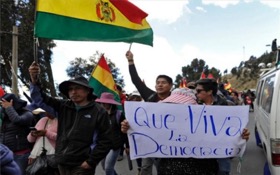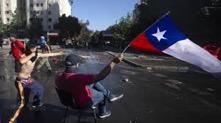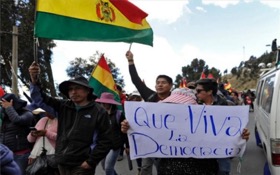by Hannah Schwemin
One year. A couple of months more. It has been one year and a couple of months since I was working in La Paz (Bolivia), taking in every moment of the city and its people. So much can happen within one year. Still, it is short enough a time that it feels strange to see the Teleférico (cable car) station that I used to pass through turning into an assembling point for protestors.

On the 21stof October, one day after general elections took place in Bolivia, people started turning out on the streets to protest against the official outcome. First results of the quick count suggested that the president Evo Morales and his opponent Carlos Mesa were running head to head, with a second-round vote likely. Then, the official website of the Supreme Electoral Tribunal went down for 24 hours. Back online again, the picture had changed substantially: Morales leading with more than ten percentage points, winning the elections by a landslide. Electoral observers, among them the Organization of American States (OAS), expressed their concerns about this significant change in the election’s results. After the intensification of the protests and the OAS as well as the Bolivian military appealing to Morales, he renounced the presidency of Bolivia on the 10th November 2019 and declared that new elections would take place.
For some people, however, the protest leading to Morales’ renunciation had ended deadly. But that does not only happen in Bolivia. And still, here in the UK, many people do not know about the events on the other side of the world. Yes, it is far away. It can easily be forgotten between assignments, grocery lists and freezing temperatures. But with all our technologies and means to stay connected, it strikes how little attention we pay to the marches in other countries. Even more so when in a group of Spanish-learners, no one seems to know that demonstrations are taking place in Chile for weeks already, and claiming lives.

Is it because the media does not inform us? Probably. The news is selected according to different standards and biases, often with a heavy focus on the West. But we can access lots of various sources thanks to the growing connectedness of the world. We do not rely just on one or two local news channels to tell us what is important. However, quite often, we do precisely that. Even when we travel and visit new places, once we are back home and with our cup of tea in hand, we tend to forget that the charming news reporter will not tell us everything. We forget that our online searches feed algorithms that present us with an exclusive selection of news, incorporating the danger that some news will not even be offered to us by the system. We forget that the place we once saw can rapidly change and in ways, we might not imagine. We do not know when, in the same market we visited, people protest for transparent elections, social justice or improved living conditions. We forget that everything can change within just a moment and that the people we met have to face these changes.
The world is too big to know everything that is going on all the time. And personal preferences, experiences and memories shape the topics we are interested in. But it is essential to be aware that countless events take place every day around the globe. Shocking and frustrating ones, fascinating and hopeful events. Those that could make us cry or laugh, make us happy or concerned. All of them impact the lives of real people, people we might have met or never will. People who have plans, ideas, dreams and fears just like everyone here. By acknowledging the abundance of events, the complexity of people’s lives and by being open for the news from the other side of the world, we work against forgetting that we all are part of one human community.
One year and a couple of months – it doesn’t matter how long ago, what matters is that we do not forget.
Hannah Schwemin is a student on the MA in Anthropology of Development and Social Transformation at Sussex.

